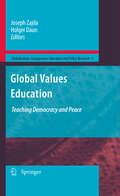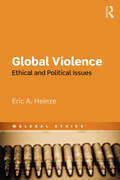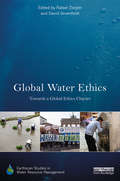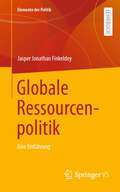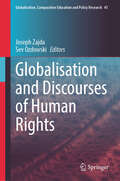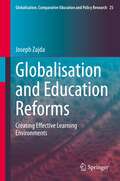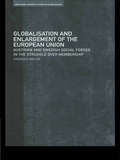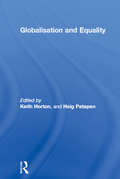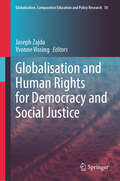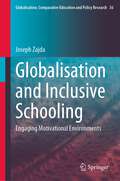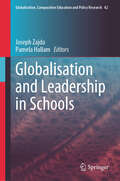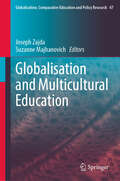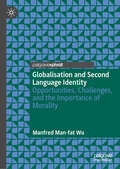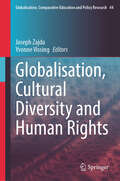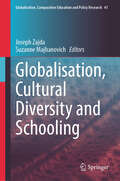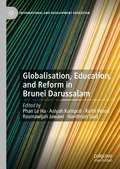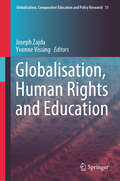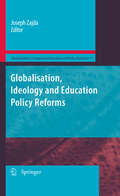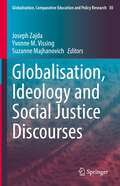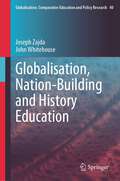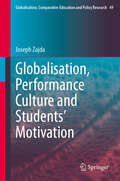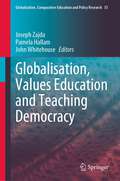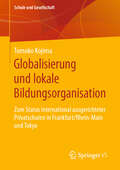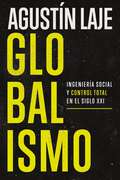- Table View
- List View
Global Values Education
by Joseph Zajda Holger DaunThis, the seventh in the 12-volume series Globalisation, Comparative Education and Policy Research, presents scholarly research on major discourses in values education globally. It is an accessible, practical yet scholarly resource that explores international concerns in the field of globalisation and comparative education. A vital sourcebook of ideas for researchers, practitioners and policy makers in values education, multiculturalism and moral education, the volume also provides a timely overview of current issues affecting values education, comparative education and education policy research in the global culture. Drawing on recent studies in the areas of globalisation, equity, social justice, and the role of the state, the book critically examines the interplay between values education, globalisation, and dominant ideologies, and reflects on its implications for policy. It goes further to explore conceptual frameworks and methodological approaches applicable in the research covering values education, globalisation, equity, and multicultural education. Individual chapters critically analyse the dominant discourses and debates pertaining to values education, multiculturalism and relevant comparative education discourses. In addition, the book evaluates the ambivalent and problematic relationship between the state, its dominant models of values education, globalisation and social change. The authors employ a number of diverse paradigms in comparative education research, ranging from critical theory to globalization. By focusing on ideology, globalisation and democracy, they attempt to examine critically both the reasons for, and the outcomes of, education reforms in the domain of values education, policy change and transformation. In doing so, they provide a more informed critique of Western-driven models of accountability, quality and school effectiveness.
Global Viewpoints: Civil Liberties
by Noel MerinoThis series provides readers with the information they need to think critically about the worldwide implications of global issues; each volume focuses on a controversial topic of worldwide importance and offers a panoramic view of opinions. This title explores free speech and freedom of expression, media freedom and freedom of the press, the right to due process, and the right to privacy; By illuminating the complexities and interrelations of the global community, this excellent resource helps students and other researchers enhance their global awareness.
Global Violence: Ethical and Political Issues (Global Ethics)
by Eric A HeinzeWhat does it mean to say that a particular war is just or unjust, that terrorism is always wrong, or that torture can sometimes be morally justified? What are the moral bases for the possession or use of nuclear weapons, intervening in other countries’ civil wars, or being a bystander to genocide? Such questions take us to the heart of what is morally right and wrong behaviour in our world. Global Violence: Ethical and Political Issues provides readers with the analytical tools to better understand the suppositions that underlie the debates about such questions, as well as advances its own reasoned and informed ethical analyses of these topics. The book engages different normative approaches from the fields of ethics, political theory, and international relations and uses them to examine a set of case studies on the subjects of inter-state and civil war, nuclear weapons, terrorism, torture and genocide.
Global Water Ethics: Towards a global ethics charter (Earthscan Studies in Water Resource Management)
by David Groenfeldt Rafael ZieglerScholarly interest in water ethics is increasing, motivated by the urgency of climate change, water scarcity, privatization and conflicts over water resources. Water ethics can provide both conceptual perspectives and practical methodologies for identifying outcomes which are environmentally sustainable and socially just. This book assesses the implications of ongoing research in framing a new discipline of water ethics in practice. Contributions consider the difficult ethical and epistemological questions of water ethics in a global context, as well as offering local, empirical perspectives. Case study chapters focus on a range of countries including Canada, China, Germany, India, South Africa and the USA. The respective insights are brought together in the final section concerning the practical project of a universal water ethics charter, alongside theoretical questions about the legitimacy of a global water ethics. Overall the book provides a stimulating examination of water ethics in theory and practice, relevant to academics and professionals in the fields of water resource management and governance, environmental ethics, geography, law and political science.
Globale Ressourcenpolitik: Eine Einführung (Elemente der Politik)
by Jasper Jonathan FinkeldeyDieses Lehrbuch setzt sich mit den zentralen Institutionen, Akteuren und politischen Prozessen um die globale Verteilung und Nutzung kritischer natürlicher Ressourcen auseinander. Einige Stimmen sehen die Welt bereits im Zeitalter der Ressourcenkriege angekommen, andere betonen, dass Ressourcenknappheit auch zu neuen Kooperationen im internationalen System führe. Unter dem Begriff „natürlicher Ressourcen“ werden sowohl nachwachsende (z.B. Getreideprodukte, Holz) sowie nicht-nachwachsende Ressourcen (z.B. Rohöl oder Erdgas) gefasst, deren Verteilung und Nutzung politischen und ökonomischen Prozesse unterliegen.
Globalisation and Discourses of Human Rights (Globalisation, Comparative Education and Policy Research #45)
by Joseph Zajda Sev OzdowskiThis book examines dominant discourses in human rights education globally. Using diverse paradigms, ranging from critical theory to discourse analysis, it examines major human rights education reforms and policy issues in a global culture. It also focuses on the ambivalent and problematic relationship between human rights education discourses, ideology and the state. The book discusses democracy, ideology and human rights, which are among the most critical and significant factors defining and contextualising the processes surrounding human rights education globally. It critiques human rights education practices and policy reforms, illustrating the shifts in the relationship between the state, ideology, and human rights education policy. The book also examines developments in research concerning human rights education. Readers will gain a more holistic understanding of the nexus between human rights education, and dominant ideologies, both locally and globally. The book also provides easily accessible, practical yet scholarly insights into international concerns in the field of human rights education in the context of global culture.
Globalisation and Education Reforms: Creating Effective Learning Environments (Globalisation, Comparative Education and Policy Research #25)
by Joseph ZajdaThis book analyses discourses of effective learning environments globally. It focuses on the student’s cultural identity and academic achievement, the significance of cultural and social capital to student’s academic achievement, motivational strategies enhancing engagement and performance, effective teaching strategies, and quality in education for all. The book discusses and evaluates the shifts in methodological approaches to effective learning environments and globalisation. It analyses such topics as the students’ cultural identity and achievement, motivational strategies for creating effective learning environment, constructivist pedagogy for critical thinking, dimensions of discrimination in schools globally, intelligence testing and the effects on academic achievement, and values education in the classroom. The book evaluates the shifts in methodological approaches to globalisation and effective learning environments globally, and their impact on education policy and pedagogy. It contributes in a very scholarly way, to a more holistic understanding of the nexus between globalisation, comparative education research and effective learning environments education reforms.
Globalisation and Enlargement of the European Union: Austrian and Swedish Social Forces in the Struggle over Membership (Routledge Studies in Globalisation)
by Andreas BielerOn January 1 1995, Austria and Sweden joined the European Union (EU). This book examines why these two countries joined at such a moment and studies their accession against the structural background of globalization. In this cutting-edge analysis, Andreas Bieler argues that conventional neo-functionalist and intergovernmentalist theories fail to explain such structural change as they take existing power structures as given. Therefore, he develops a neo-Gramscian perspective as an alternative approach to European integration.
Globalisation and Equality (Challenges of Globalisation #Vol. 1)
by Keith Horton Haig PatapanIs globalisation creating a more unequal world? Is it creating new forms of inequality? Does it make certain pre-existing forms of inequality more morally or politically significant than they would otherwise have been?Globalisation and Equality examines these and related questions, exploring the way increasing globalisation is challenging our conceptions of equality. The contributors explore these themes from both theoretical and empirical perspectives. Some adopt a more abstract approach, exploring foundational questions concerning the meaning of equality, its social and political dimensions, and more specifically its moral implications in a global context. Others engage the general themes of globalisation and equality by focusing on specific topics, such as welfare, citizenship, gender, culture, and the environment.Original in the questions it poses, and interdisciplinary in its approach, this collection of essays will appeal to all those with an interest in globalisation and equality.
Globalisation and Human Rights for Democracy and Social Justice (Globalisation, Comparative Education and Policy Research #50)
by Joseph Zajda Yvonne VissingThis book analyses major discourses of human rights for democracy and social justice. The chapters contained in the book examine critically major issues confronting human rights for democracy and social justice both locally and globally. The chapters analyze the challenges that different societies are confronted with, as they attempt to implement, protect and defend democracy, cultural diversity and human rights in an ever-changing world, and culturally diverse environment. Topics covered include dimensional concerns for social justice and human rights and what to do about them, human rights for democracy and social justice, and celebrating cultural diversity in sport. The book will help readers to explore their own views and consider more broadly what may be in the best interests of a fair and just society, as envisioned in human rights treaties, human rights education in schools, and cultural diversity.
Globalisation and Inclusive Schooling: Engaging Motivational Environments (Globalisation, Comparative Education and Policy Research #36)
by Joseph ZajdaThis book analyses discourses of inclusive schooling and engaging motivational environments globally. It focuses on the student’s identity, belonging, performance in the classroom, and the significance of cognitive, cultural, emotional and social capital to student’s academic achievement. The book discusses and evaluates the shifts in methodological approaches to inclusive and engaging learning environments. It analyses topics such as the students’ cultural identity and achievement, motivational strategies for creating engaging learning environment, the use of constructivist pedagogy for critical thinking, social constructivism, and values education in the classroom. The book also analyses and evaluates the shifts in methodological approaches to globalisation and inclusive schooling globally, and their impact on performing schools. It contributes in a very scholarly way, to a more holistic understanding of the nexus among globalisation, comparative education research, inclusive schooling and engaging learning environments.
Globalisation and Leadership in Schools (Globalisation, Comparative Education and Policy Research #42)
by Joseph Zajda Pamela HallamThis book analyses dominant discourses of globalisation and leadership in schools. The chapters in this volume advance further the discussions of the nexus between globalisation and leadership in schools. The politics of education reforms, governance and school leadership in the 21st century reflect a new emerging paradigm of standards-driven and outcomes-defined educational policy change. This ethos of academic performance has affected the nature and the role of school leadership in the 21st century, and emerging educational challenges and strategies. Academic achievement, standards, and educational results overall, depend on the nature and quality of school leadership, teachers and school’s culture. Another emerging change affecting school leadership is autonomy in schools in designing curricula and managing resources, where the role of the school leader has grown far beyond that of administrator. School autonomy has also affected the changing role of school leadership. The other key role of effective leadership is the focus on diagnosing the school’s needs, and supporting, evaluating and developing teacher quality. Developing school leaders in the 21st century requires clearly defining their key leadership roles and responsibilities for leading and inspiring teachers to achieve high academic standards, and the quality of the curriculum, and acknowledging, and accepting their significant role in improving school‘s image, as a standards-driven and academically performing institution.The book contributes in a very scholarly way, to a more holistic understanding of the nexus between globalisation, and dominant discourses of leadership in schools.
Globalisation and Multicultural Education (Globalisation, Comparative Education and Policy Research #47)
by Joseph Zajda Suzanne MajhanovichThis book analyses dominant discourses of globalisation, multiculturalism and schooling. The chapters advance further the discussions on globalisation and its impact on cultural diversity and multiculturalism in a globalised world. Multicultural education, as presented in this volume, is seen in a broad context. It includes factors such as race, ethnicity, gender, socio-economic status, culture, age, and physical ability, as well as a variety of beliefs and values. Zajda has argued that globalisation represents a synthesis of technology, ideology, and organisation, specifically related to border crossings of people, global finance, trade, IT convergence, as well as cross-cultural communication. The reality of multiculturalism has been brought into stronger focus because of globalisation. Multiculturalism is more evident today because of globalisation. The book contributes in a very scholarly way, to a more holistic understanding of the nexus between globalisation and dominant models of multicultural education, and their impact on students’ engagement, and academic achievement.
Globalisation and Second Language Identity: Opportunities, Challenges, and the Importance of Morality
by Manfred Man-fat WuThis book focuses on how globalisation influences and affects second language (L2) identity, including both benefits and caveats of globalisation. The author takes a philosophical perspective to the topic, drawing on the theoretical foundations of Kant and Hegel to explore positive and negative impacts of issues related to globalisation such as human rights and identity reconstruction, and argues that morality should be considered as a key component in fostering L2 identity. Since L2 autonomy - the capacity to control the psychological and socio-cultural dimensions related to L2 learning (Benson, 2001) - is an integral part of L2 identity and contributes to successful language learning, the author considers how to reconceptualise and foster L2 autonomy in the age of globalisation. He finds that globalisation has created new challenges and demands for L2 teachers, and explores how far they must transform their identity for effective teaching, including recommendations for the future. This book will be of particular interest to students, teachers and academics in fields including applied linguistics, language education, language teacher training, psycholinguistics, and sociolinguistics, as well as scholars of sociology and philosophy.
Globalisation, Cultural Diversity and Human Rights (Globalisation, Comparative Education and Policy Research #44)
by Joseph Zajda Yvonne VissingThis book analyses major discourses of cultural diversity and human rights. The chapters contained in this book examine critically major issues confronting cultural diversity and human rights, both locally and globally. They analyze the challenges that different societies are confronted with, as they attempt to implement, protect and defend cultural diversity and human rights in an ever-changing world, and culturally diverse environment. Topics covered include celebrating cultural diversity in sport, human rights legacies of the African slave trade and the long-term implications of colonialism, assessment of human rights and sports, effectiveness in intercultural dialogue in dominant discourses of cultural diversity and human rights, and the rising importance of cultural diversity and human rights in sport for children and youth.This book will be helpful to readers to explore their own views and consider more broadly what may be in the best interests of a fair and just society, as envisioned in human rights treaties, human rights education in schools, and cultural diversity.
Globalisation, Cultural Diversity and Schooling (Globalisation, Comparative Education and Policy Research #41)
by Joseph Zajda Suzanne MajhanovichThis book analyses dominant discourses of globalisation, cultural diversity and schooling. The collection in this volume advance further the discussions on the phenomenon of globalisation, and its far-reaching effects on our world, and consider cultural diversity in its broadest sense, as it manifests itself in a globalised world. Zajda has argued that globalisation represents a synthesis of technology, ideology and organisation, specifically related to border crossings of people, global finance and trade, IT convergence as well as cross-cultural communication. The reality of cultural diversity has been brought into stronger focus because of globalisation. Cultural diversity, always present in society is more evident today because of globalisation. The ways society copes with cultural diversity have changed such that the embrace of cultural diversity as part of identity is encouraged in liberal democracies. Cultural diversity, as presented in this volume is seen in a broad contextand includes factors such as race, ethnicity, gender, sexual orientations, socio-economic status, culture, age, and physical ability as well as a variety of beliefs and values. The book contributes in a very scholarly way, to a more holistic understanding of the nexus between globalisation, cultural diversity, democracy, and equality for all.
Globalisation, Education, and Reform in Brunei Darussalam (International and Development Education)
by Le Ha Phan Keith Wood Asiyah Kumpoh Rosmawijah Jawawi Hardimah SaidThis book focuses on the intertwined relationships between globalisation, nation-building, education, and reform as manifested throughout the modern history of Brunei Darussalam, an Islamic monarchy located on the island of Borneo in Southeast Asia. It is the first book dedicated to the examination of Brunei’s education system, schooling, teacher education, and society in close connection with the national philosophy Melayu Islam Beraja (MIB) or Malay Islamic Monarchy. The authors provide a historical understanding of the country’s education and tell Brunei’s story of educational reform and change in its own language, narratives, accounts, and unique standpoints. Interdisciplinary chapters draw on significant historical and textual sources in three languages, namely Arabic, English, and Malay, to contribute to scholarship on education studies, international and comparative education, and international and development education.
Globalisation, Human Rights and Education (Globalisation, Comparative Education and Policy Research #51)
by Joseph Zajda Yvonne VissingThis book analyses major discourses of human rights and education. It examines critically major issues confronting human rights and education, both locally and globally. The various chapters analyze the challenges that different societies are faced with, as they attempt to implement, protect and defend democracy, cultural diversity and human rights in schools. The book helps readers to explore their own views and consider more broadly what may be in the best interests of a fair and just society, as envisioned in human rights treaties, human rights education in schools, and cultural diversity.
Globalisation, Ideology and Education Policy Reforms
by Joseph ZajdaThe eleventh in the 12-volume book series Globalisation, Comparative Education and Policy Research, this work sets out to explore the interrelationship between ideology and education reforms, setting it in a global context. With this as its focus, the chapters represent hand-picked scholarly research on major discourses in the field of comparative education. A compendium of the very latest thinking on the subject, this volume is, like the others in the series, a state-of-the-art sourcebook for researchers, practitioners and policymakers alike. Not only do the chapters offer a timely overview of current issues affecting comparative education and education policy research in what is now a global educational culture, but the work also contains ideas about future directions that policy reforms could take. The book draws upon recent studies in the areas of globalisation, equity, and the role of the State. It explores conceptual frameworks and methodological approaches applicable in the research covering the State, globalisation, and education reforms. The research evinces the neo-liberal ideological imperatives of current education and policy reforms, and illustrates the way that shifts in the relationship between the State and education policy affect current trends in education reforms and schooling globally. Individual chapters critically assess the dominant discourses and debates on comparative education research in education and policy reforms. Using diverse comparative education paradigms from critical theory to globalisation, the authors focus on globalisation, ideology and democracy and examine both the reasons and outcomes of education reforms, policy change and transformation. They provide a more informed critique of models of accountability, quality and school effectiveness that are informed by Western social values. The book also draws upon recent studies in the areas of equity, cultural capital and dominant ideologies in education.
Globalisation, Ideology and Social Justice Discourses (Globalisation, Comparative Education and Policy Research #30)
by Joseph Zajda Suzanne Majhanovich Yvonne M. VissingThis book examines dominant discourses in social justice education globally. It presents cutting-edge research on the major global trends in education, social justice and policy research. Using diverse paradigms, ranging from critical theory to discourse analysis, the book examines major social justice and equity education reforms and policy issues in a global culture, with a focus on the ambivalent and problematic relationship between social justice education discourses, ideology and the state. The book discusses democracy, ideology and social justice, which are among the most critical and significant factors defining and contextualising the processes surrounding social justice education reforms globally. It critiques current social justice education practices and policy reforms, illustrating the shifts in the relationship between the state, ideology, and social justice education policy.Written by authors from diverse backgrounds and regions, this book examines current developments in research concerning social justice education. It enables readers to gain a more holistic understanding of the nexus between social justice education, and dominant ideologies, both locally and globally. It also provides an easily accessible, practical, yet scholarly insights into local and global trends in the field of social justice education. Discourses of Globalization, Ideology and Social Justice, with contributions from key scholars worldwide, should be required reading for a broad spectrum of users, including policy-makers, academics, graduate students, education policy researchers, administrators, and practitioners.
Globalisation, Nation-Building and History Education (Globalisation, Comparative Education and Policy Research #40)
by Joseph Zajda John WhitehouseThis book uses historiography and discourse analysis to provide a new insight into understanding the nexus between ideologies, the state, and nation-building—as depicted in history school textbooks. It focuses on the interpretation of social and political change, significant events, and examining possible new biases and omissions in school textbooks. The ‘Europeanization’ of history textbooks in the EU is an example of western-dominated Grand Narrative of pluralist democracy, multiculturalism, and human rights, according to the canon of a particularly European dimension. Various public debates in the USA, China, the Russian Federation (RF), Japan, and elsewhere, dealing with understandings of a nation-building, national identity, and history education point out to parallels between the political significance of school history and the history education debates globally.The book demonstrates that the issue of national identity and balanced representations of the past continue to dominate the debate surrounding the goals, dominant ideologies and content of history textbooks, and historical narratives. It concludes that competing discourses and ideologies will continue to define and shape the nature and significance of historical knowledge, ideologies and the direction of values education in history textbooks. This book provides an easily accessible, practical, yet scholarly insights into local and global trends in the field of history education, and should be required reading for a broad spectrum of users, including policy-makers, academics, graduate students, education policy researchers, administrators, and practitioners.
Globalisation, Performance Culture and Students’ Motivation (Globalisation, Comparative Education and Policy Research #49)
by Joseph ZajdaThis book analyses education policy trends that affects performing culture, academic excellence and global competitiveness in schools. It focuses on students’ cultural identities and engagement, inclusive schooling, eliminating discrimination and discriminatory practices in the classroom, and relevant values education. One of the major effects of cultural and economic forces of globalisation is that schools and school leaders, like other educational organisations, having modelled their goals and strategies on the entrepreneurial business model. They are compelled to embrace the corporate ethos of efficiency, accountability, performance, and profit-driven managerialism. This corporate ethos reflects a dominant neo-liberal ideology, which exerts a powerful influence on major discourses of democracy, equality, social justice, and education, both locally and globally. By examining the education policy shifts in the use of major discourses concerning performing culture and education, this book offers a comprehensive synthesis of the intersecting and diverse discourses of globalisation, cultural diversity, performing culture, and education. It provides innovative ideas concerning the future directions for authentic models of globalisation, performance culture and students’ motivation.
Globalisation, Values Education and Teaching Democracy (Globalisation, Comparative Education and Policy Research #35)
by Joseph Zajda Pamela Hallam John WhitehouseThis book critiques dominant discourses and debates pertaining to values education, cultural identity and teaching democracy, set against the backdrop of growing social stratification and unequal access to quality education. It addresses discourses concerning globalisation, ideologies and the state, as well as approaches to values education and teaching democracy in schools. The book explores the ambivalent and problematic connections between the state, globalisation, values education and teaching democracy. It also explores conceptual frameworks and methodological approaches applicable to research on values education, multiculturalism and identity politics. Drawing on diverse paradigms, ranging from critical theory to globalisation, and by focusing on globalisation, ideology and values education, the book critically examines research dealing with cultural diversity and its impact of identity politics. Given the need for a multiple perspective approach, the authors have diverse backgrounds and hail from different countries and regions, offer a wealth of insights, contributing to a more holistic understanding of the nexus between values education, multiculturalism and national identity. With contributions from key scholars worldwide, the book should be required reading for a broad spectrum of users, including policy-makers, academics, graduate students, education policy researchers, administrators and practitioners.
Globalisierung und lokale Bildungsorganisation: Zum Status international ausgerichteter Privatschulen in Frankfurt/Rhein-Main und Tokyo (Schule und Gesellschaft #71)
by Tomoko KojimaDie qualitative Vergleichsstudie beschäftigt sich mit der Frage, wie sich die lokale Bildungsorganisation gegenwärtig hinsichtlich der Globalisierung und der Präsenz der Privatschulen mit internationalem Profil verändert. Betrachtet werden exemplarische Fälle in zwei global cities, Frankfurt/Rhein-Main und Tokyo. Dabei werden unterschiedliche Formen international ausgerichteter Privatschulen sowie ihre Differenzierung von bzw. Identifikation mit dem lokalen Bildungskontext aufgezeigt. Die damit einhergehende Überschreitung von Grenzen im nationalstaatlichen Erziehungssystem und deren Folgen werden semantisch aus der Governance-Perspektive sowie aus systemtheoretischer Sicht regional kontrastierend diskutiert.
Globalismo: Ingeniería social y control total en el siglo XXI
by Agustin LajeDesvela los mecanismos ocultos de la dominación mundial con Globalismo: Ingeniería social y control total en el siglo XXI. El exitoso autor Agustín Laje desentraña magistralmente la malvada realidad de nuestro mundo moderno e ilumina las tinieblas de las fuerzas de poder que tratan de controlar a la humanidad. El globalismo no es globalización, sino una demoledora ideología que supone el más ambicioso proyecto de ingeniería social y control total en curso. Institucionalizada en organizaciones que, por definición, no tienen ni patria, ni territorio ni pueblo, esta ideología pretende parir un régimen político antidemocrático de alcance global. Así la soberanía de las naciones se redistribuye entre organizaciones supranacionales como el Foro Económico Mundial o la ONU con su Agenda 2030, liberadas de las limitaciones de los intereses particulares de los pueblos, para coordinar las transformaciones necesarias para nuestra «supervivencia». El globalismo también propone nuevas formas de legitimidad basadas en la tecnocracia y la supuesta filantropía de organizaciones como la Fundación Gates, la Open Society de Soros, y la Fundación Rockefeller.En esta obra, Agustín Laje explica magistralmente el origen y la formación del contrato social de nuestros Estados nacionales sobre una base democrática, mostrando cómo el globalismo busca culpabilizar estas estructuras para llevarnos a un callejón sin salida, donde todo se cede a una gobernanza global no representativa, la máxima expresión de la oligarquía de unos pocos privilegiados a los que nadie votó, y que ante nadie rinden cuentas pero que pretenden dirigir el destino del planeta.El autor llama a todos los actores sociales, políticos, religiosos e intelectuales a unirse contra el globalismo. La paradoja de que los patriotas olviden sus fronteras para esta batalla cultural adquiere un nuevo significado. Conocer la verdad y denunciar la mentira es un arma valiosa que este libro ofrece.GlobalismUncover the secret workings of world domination with Globalism: Social Engineering and Total Control in the 21st Century. Best-selling author Agustín Laje masterfully unravels the sinister reality of our modern world and sheds light on the darkness of the forces of power that seek to control humanity.Globalism is not globalization, but rather a devastating ideology representing the most ambitious social engineering and total-control project currently underway.Institutionalized by organizations such as the World Economic Forum or the UN with its Agenda 2030, Globalism also promotes new forms of legitimacy based on &“technocracy&” and the supposed philanthropy of organizations such as the Gates Foundation, Soros&’ Open Society, and the Rockefeller Foundation.In this book, Agustín Laje skillfully explains the origin and formation of the social contract of our nation-States based on democracy, demonstrating how globalism seeks to blame these structures in order to steer us into a dead-end, where everything is handed over to a non-representative global governance. This represents the ultimate expression of an oligarchy formed by a few privileged elites who were elected by no one and are accountable to nobody, yet aim to dictate the destiny of the planet.The author calls on all social, political, religious, and intellectual figures to unite against globalism. The paradox of patriots disregarding their borders for this cultural battle takes on a new significance. Knowing the truth and denouncing the lie is a valuable weapon that this book offers.
